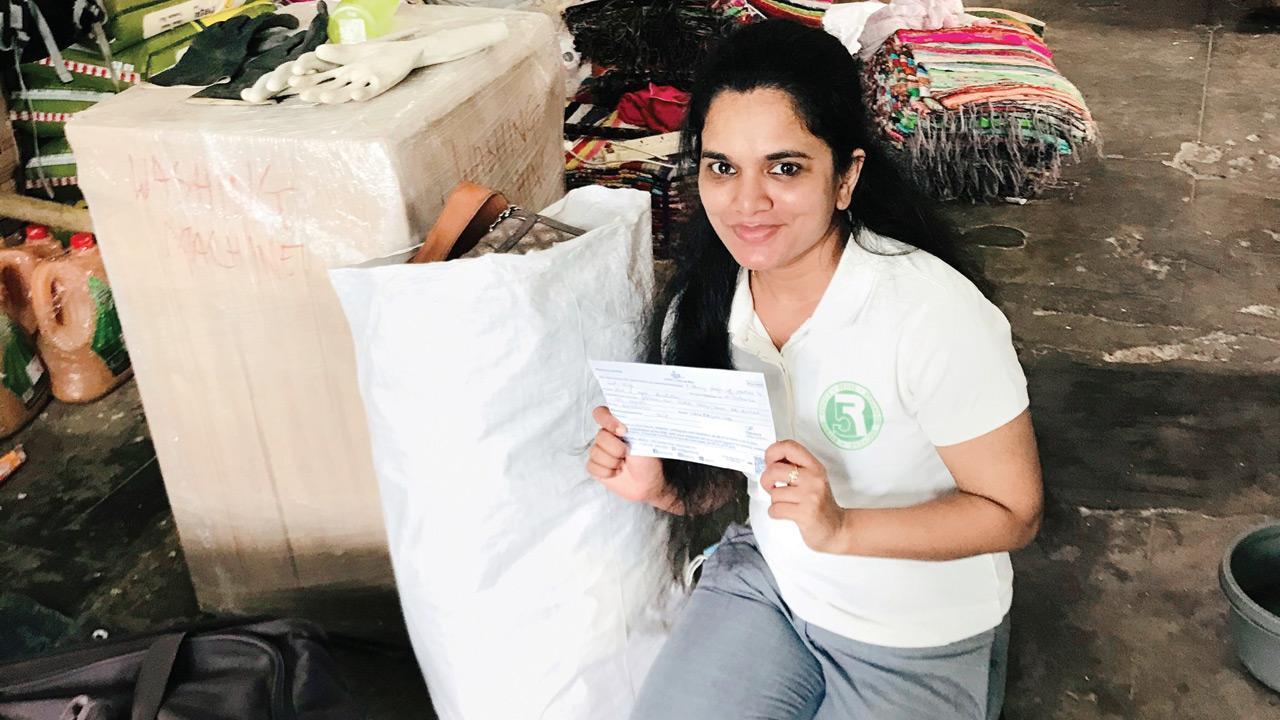June marks the first anniversary of 5RCycle Foundation, a non-profit dry waste aggregator that simplifies eco-friendly options for a cleaner Mumbai

Dr Smita Birkar at a cloth donation drive. Pics Courtesy/Dr Smita Birkar, Jade Williams
As the rains lash Mumbai, the city readies for familiar scenes of flooded streets and clogged gutters,where the ocean spews back what we’ve thrown into it. Dr Smita Birkar tells us that recycling is a way to prevent drains from getting blocked, and waste from resurfacing on our shores. The Borivali West resident says, “When dry waste mixes with sewage or wet waste, it becomes useless. But if people start recycling, less garbage will be dumped in landfills and littered trash won’t clog anything. Recycling will route it to the right channel, and prevent good recyclable material from getting wasted.” After getting a PhD in Plastic Engineering and four years of corporate experience in the plastics industry, Dr Birkar decided to direct her knowledge to more meaningful work. That’s how 5RCycle Foundation, a non-profit dry waste aggregator, came about.
ADVERTISEMENT
Dr Birkar, Ishwarya Harijan, member of 5RCycle, and chef Jade Williams
Start at the beginning
This month, as the foundation celebrates its first anniversary, Dr Birkar continues to amplify its message: “I educate people on recycling since I’m from the fraternity. Through this NGO, I can create awareness and also have infrastructure to collect dry waste and e-waste donations because people want to see action and not just words.”
5RCycle grows its audience through awareness campaigns online. So far, the non-profit has received 10,000 kgs of donations. Dr Birkar schedules visits to small housing societies and local stores all across Mumbai to pick up the collection, aided by a small team. “Recurring donors are very few, so we keep pushing for them by providing door-to-door service. Our consistency has worked,” she narrates.
As an aggregator, 5RCycle’s work is an important step in recycling. Step one, she says, should be carried about by consumers. It includes cleaning and segregating the waste before donating it for recycling.
Members of a housing society in Charkop practise segregation with 5RCycle Foundation
Processes matter
Back at the foundation’s centre in Kandivali West, the donated waste is categorised based on condition and material, and then routed to recycling NGOs that have the infrastructure to recycle it. Waste can be downcycled where its elements are used at a lower functionality than the original product, or upcycled into same or high value products and sold. Dr Birkar explains, “Many recycling companies have e-commerce platforms where they sell the recycled products and are looking to develop such markets.” So, if you’re looking to extend the life of a product and contribute to a circular economy, buy recycled goods, she encourages.
Tips to go green
>> Reduce, refuse, reuse, repurpose and recycle. This includes carrying your own bottles and cloth bags, organic waste composting, donating and thrifting clothes, and upcycling waste into planters and pen stands.
>> Recycling is not done at a domestic level. Go through the right channels like local recycling partners.
>> Don’t forget to wash, dry and segregate dry waste before you donate it.
>> Don’t litter.
Log on to: www.5rcycle.org or @5rcycle on Instagram
 Subscribe today by clicking the link and stay updated with the latest news!" Click here!
Subscribe today by clicking the link and stay updated with the latest news!" Click here!






